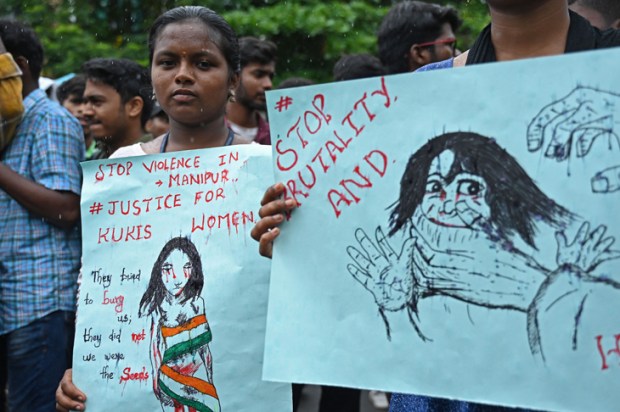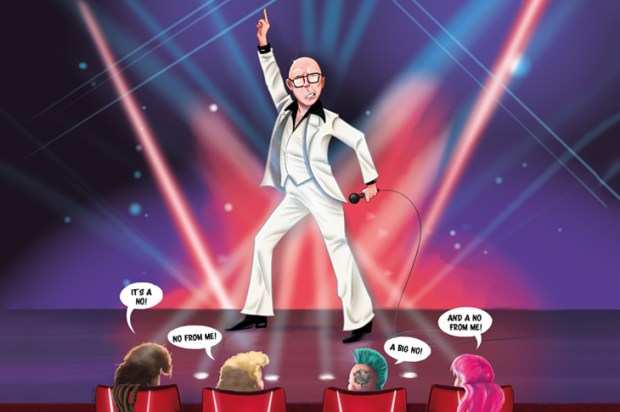The process of amending the constitution is extraordinarily difficult. If, despite that, the Voice gets over the line it simply will not be possible to repeal it, ever. That sobering reality ought to concentrate minds amidst calls to get with the ‘vibe’. We must design close to a perfect model to maximise benefits and eliminate risks. This test is absolutely not met. The conclusion of constitutional conservative lawyers like Greg Craven and Julian Leeser who denounce the model as ‘fatally flawed’ yet will vote and campaign for Yes is intellectually incoherent, elevating emotion above reason, and morally muddled, as on-fire James Allan wrote last week. The counterpoint to the Craven-Leeser sentiment is the first TV ad against the Voice from Fair Australia featuring Jacinta Price. In a key sentence, she says: ‘I don’t want to see my family divided along the lines of race, because we are a family, of human beings, and that’s the bottom line.’ And so say all of us with ‘blended families’.
On 3 April, Leeser gave an important speech at the National Press Club. This essay builds around that speech to demonstrate his incoherence. He began with the trite acknowledgment to traditional owners and the paying of respect to elders past and present that are terribly off-putting. Both are efforts to assuage white guilt, not address Aboriginal disadvantage. Saying he is ‘a non-Indigenous Australian’ is also problematical. If not Australian, what is his country of indigeneity? Or does he not have a country to call his own? What exactly does ‘indigenous’ mean in contemporary Australia? The first inhabitants? What if our best knowledge indicates they migrated from somewhere else – do we then subordinate objective scholarship to Dreamtime mythology? Does it refer to the original inhabitants? What if I claim ‘original inhabitant’ status because India was once part of the supercontinent of Gondwanaland before it split and one part floated north, hit the Asian mainland and the collision created the mighty Himalayas? Does it refer to anyone born here? If not, then what does this mean for a fifth or sixth generation South Australian of Irish descent? Is she indigenous Irish but not Australian? As a corollary, does an Australian Aborigine, who was born in Ireland of ancestors who went there five or six generations ago, remain an indigenous Australian – shades of the High Court’s Love decision? In hindsight, the restriction of ‘indigenous’ to Aborigines and the ‘welcome to country’ ritual have proven damaging, normalising instead of overcoming racial separation and promoting reconciliation. The idea that I should be welcomed to my own country is frankly bizarre.
The debate is riddled with three sets of confusions. The first results from the conflation of support for a Voice as an abstract principle, and support for the Albanese model. We saw this in the republican debate. Despite a comfortable majority indicating in-principle support for a republic, it proved impossible to find an actual model that most people could support and the republic proposal was defeated. At the international level, we see the same dynamic in efforts to restructure the UN Security Council. Most countries support it in the abstract but there are always more losers than winners when any actual model is put up and so the initiative has failed for decades. In the meat of his speech, Leeser offers a compelling critique of the flaws of the Albanese model. He argued for a bottom-up process starting from the local and moving up to the national. Albanese has insisted on the opposite approach and abandoned the deliberative process and the search for consensus, demanding bipartisan support for a unilateral model and calling on people to vote Yes to a model whose details will be legislated later. These don’t indicate ‘a government acting in good faith’, Leeser concludes.
The second confusion is between a symbolic acknowledgment in the constitution of the place of Aboriginal communities in Australian history and society, and a policy advisory body legislated by parliament on Aboriginal matters.
A constitution specifies the organs of government; the manner of their creation and organisation; their powers and limits in relation to one another and to citizens; and the procedures for formulating and executing laws and resolving conflicts among citizens and groups. It encapsulates the social purpose of an all-inclusive political community. It enumerates the system of checks, limits and balances with both a licence function to permit some actions and the leash function to proscribe other actions. Leeser noted the extraordinary success of the Australian constitution that has ‘stood the test of time’. He warned that nothing in the constitution is ‘inconsequential’ and its final arbiter is the High Court whose judgment cannot be amended by parliament. Unintended consequences of any amendment ‘can cascade through our system of government’ and clever lawyers will be able to find room ‘to egg on an activist judiciary to imply all sorts of things which were never intended’. Inserting recognition of all three components of the Australian population; namely, the Aborigines, European settlers and migrants, in the preamble – the Liberal party’s alternative – will greatly lessen the scope for judicial adventurism.
The third confusion is mixing up ‘feel good’ and ‘do good’ when defining the terms of the relationship of the Aboriginal peoples with the broader Australian community. Leeser reiterated the familiar litany of failures with respect to Aboriginal communities: life expectancy, literacy, housing, violence, incarceration rates, suicides and community safety. Not a single one of this catalogue of dysfunction among Aboriginal Australians will be addressed by the Voice. This is precisely the major point of the critique from the likes of Warren Mundine and Senator Jacinta Nampijinpa Price. The overriding goal of the Voice should be the difference it will make on the ground, not making us feel virtuous on the morning after the referendum. Instead it will risk governmental paralysis, be complex in its bureaucratic sprawl, attract grifters and rent-seekers, prove costly in implementation and heighten disconnection and disenchantment on the ground.
US Chief Justice John Roberts holds, ‘The way to stop discrimination on the basis of race is to stop discriminating on the basis of race.’ Conversely, the best way to harden and institutionalise racial identity is to carve it into the constitution. The Voice will entrench the soft bigotry of low expectations that regards Aboriginal people – the many and growing examples to the contrary notwithstanding – as permanent state dependants who are incapable of ever looking after themselves. It will vastly complicate Australia’s challenge of effective and timely governance in the national interest for the common good. Born of conceptual confusion, the Voice speaks not to all Australians’ better angels but to some white Australians’ guilt complex.
Thanks, but No thanks.
Got something to add? Join the discussion and comment below.
You might disagree with half of it, but you’ll enjoy reading all of it. Try your first month for free, then just $2 a week for the remainder of your first year.













